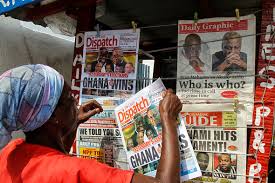The report of the performance of the Seventh Parliament by the Speaker and the mourning of the state of Ghana’s democracy by a member of the National Democratic Congress are some of the trending stories in the Ghanaian press on Tuesday.
The Graphic reports that the record higher number of sittings, volume of work and major reforms under the Seventh Parliament of the Fourth Republic have culminated in the adoption of the principle by Parliament that Private Members’ Bills should be allowed to fill in the gaping gaps in the country’s laws and meet the needs of the times.
With seven Private Members’ Bills being worked on and two laid before the House, the Speaker of Parliament, Professor Aaron Mike Oquaye, believes the legislature is on the path of achieving major milestones.
So far, the Public Health (Amendment) Bill, 2020 and the Road Traffic (Amendment) have been laid before the House and are at the second reading stage.
Other bills, such as the Criminal Offences (Amendment) Bill, the Public Order (Amendment) Bill, the Electoral Offences and Related Malpractices Bill, the Budget Bill and the Reproductive Assisted Technologies Bill, have been initiated by private members from both sides of the House.
The House, which has so far accepted over 3,461 papers for consideration, is set to be dissolved on the night of January 6, next year, a day before the inauguration of the eighth parliament.
The newspaper says that the National Democratic Congress’ (NDC) Member of Parliament (MP) for the North Tongu Constituency of the Volta Region, Samuel Okudzeto Ablakwa says the NDC is mourning the state of Ghana’s democracy.
He said the party is greatly upset with the militarisation of the country’s elections.
Explaining why the NDC’s MPs on Monday, December 14, 2020, went to the Parliament in black and red attire in a radio interview with Accra-based Citi FM, which was monitored by Graphic Online, Mr. Ablakwa expressed worry over the conduct of the Chairperson of the Electoral Commission (EC), Mrs Jean Mensa, regarding the 2020 general elections.
“We have an Electoral Commissioner who keeps changing figures and as we speak, we don’t know which figure she is working with and what she is going to gazette,” he said.
He said “the use of brute force to overturn constituency results we (NDC) won” was unacceptable and that “We (NDC) insist that we have formed the majority in the 8th Parliament and we will not accept anything short of a majority of the NDC’s side in the 8th parliament.”
For Mr. Ablakwa, many observer missions who monitored this year’s elections have all spoken about the lack of transparency in the collation of results for the 2020 elections, citing the European Union’s observer mission and that of the ECOWAS as examples.
The Times reports that the World Bank Board of Directors have approved a $60 million International Development Association (IDA) grant to help Ghana and some other African countries strengthen the resilience of their agricultural sectors to the threat posed by climate change.
The grant fulfils the World Bank’s commitment at the 2019 United Nations Climate Summit to increase its support to the CGIAR, a global partnership that unites international organisations engaged in research about food security, to help advance agricultural research efforts for the benefit of rural households that rely on agriculture as a major livelihood source, and to increase food security.
Through the new operation –“Accelerating the Impact of CGIAR Climate Research for Africa project, AICCRA”—the World Bank will support research and capacity-building activities carried out by the CGIAR centres and partner organisations, with the goal of enhancing access to climate information services and validated climate-smart agriculture technologies in Africa.
By gaining better access to climate advisories linked to information about effective response measures, farmers and livestock keepers will be able to better anticipate climate-related events and take preventative actions that can help to safeguard productive activities and avoid catastrophic losses.
Mobilising science and innovation for the benefit of agricultural development is consistent with the commitments made during the Africa Food Security Leadership Dialogue (AFSLD), a multi-partner initiative formed in 2019 to deal with the problem of hunger and vulnerability to climate change on the African continent.
AICCRA activities will be concentrated in six countries —Senegal, Ghana, Mali, Ethiopia, Kenya, and Zambia— but its benefits will be realised region-wide.
The newspaper says that 44 people were killed and 169 other suffered injuries in 155 road accidents during the recent elections throughout the country.
The accidents, which involved 86 commercial vehicles, 89 private vehicles and 69 motorcycles, occurred between December 7 and December 10, 2020.
The Director of Operations of the Motor Traffic and Transport Department (MTTD) of the Ghana Police Service, Superintendent of Police (Supt), Dr. Sasu Mensah,,who disclosed these to Ghanaian Times, yesterday, said Greater Accra region, recorded the highest accidents with 47 cases, followed by Ashanti with 35 cases.
He expressed worry that causes of the accidents included drunk driving, speeding and indiscipline on the roads.
Dr. Mensah said most of the accidents were avoidable if precautionary measures were taken,adding that road accidentsaffected the nation’s human resource and development.
He indicated that the MTTD would deploy enough personnel to enforce traffic rules to reduce road accidents during the Christmas season, stressing that “there would also be enough personnel at the major corridors to ensure safety of passengers and commuters”.
Dr. Mensah urged drivers to “adhere to road safety regulations, wrongful overtaking, over loading and drunk driving to save lives and properties.”
GIK/APA


